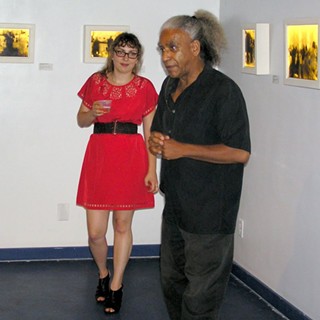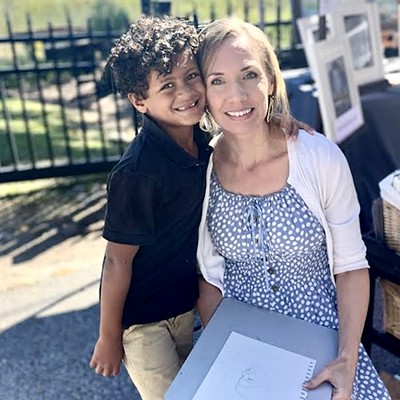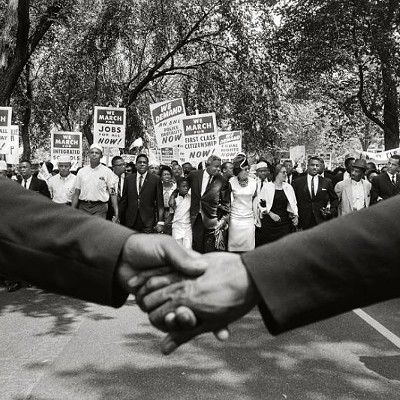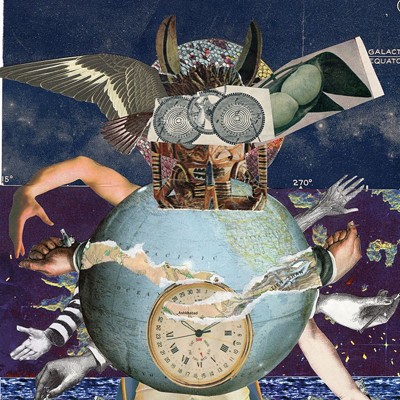MY MENTOR, Jerome Meadows, along with being one of the most influential figures in my life, is a visionary artist, owner and director Indigo Sky Community Gallery, and most recently, a co-founder of ARC Savannah.
In the two years I worked beside Jerome as the Indigo Sky Gallery Manager, we put on 22 exhibitions, renovated the gallery, plus countless other things, including bringing to life "Blank Page Poetry."
A year after leaving, it felt right to sit down and discuss our relationship, the strange place we have ended up —leading two different art organizations— and his upcoming lecture about public art.
Working together, we found something magical. For Jerome, “[The most fulfilling thing was] the sharing of energy, the sharing of the connection. Just being in that space with someone else. It was almost like we were husband and wife.”
We were an amazing team. Nothing was impossible with each other’s energy fueling our endeavors. We laughed, we fought, but mostly, we did.
For me, the term mentor is slightly misleading. It’s a little too mythical. It conjures images of the wise old sage imparting truths to his young disciples. In reality, it’s more personal.
“On the basic level, it is the transference of knowledge based on skill and expertise. In that, the one person has their knowledge base and they are conveying that through a hands-on experience. Learning by doing,” Jerome says.
It’s about experiential knowledge, not “theoretical academic information,” as Jerome noted. It’s impossible to forget what a mentor teaches because the learning process changes the mentee. It’s life altering. Experience can’t be discarded at the end of the semester like a textbook. It’s embedded in the fabric of an individual.
As a student, Jerome found mentors in his professors at RISD (Funny, considering his skepticism of traditional academia.)
“That college setting was less about the classroom and more about a relationship with the professor. The most important part was what I learned byway of technical skills, for example, what is couched in the lifestyle of the artist,” Jerome tells me. “I don't remember grading being a part of the dynamic. It was more like, ‘Wow, this person has skill and experience I'm fascinated by and they are willing to share it.’”
At Indigo Sky, I never received college credit. I showed up because I wanted to be there— doing, learning, and immersing in the art community. It was essential I was working with Jerome. Our friendship was as important to my education as the skills I developed.
Now, the dynamic in our relationship has shifted. Jerome will always be my mentor, but I’m no longer his student. After “working hand-in-hand,” we are now leading different organizations, both addressing the same large issue.
“I find myself trying not to think of it from the point of view of the husband and wife. It's hard not to because, as you say, we're still working under the same roof,” Jerome says.
When I first learned of ARC, I felt a pang— a sad sense of distance and time coming over me. But, I knew in that moment we would work together in our new roles. Despite the faith we felt, we experienced similar reactions to ARC’s unveiling.
“People would say, ‘Well, ARC/Art Rise, why are there two groups?’ My inclination was to say, ‘Why are there two movie theaters? Why are there two museums?’ It seemed kind of ridiculous. The assumption seemed to be we’re going to be competing with each other. To the extent that there is competition, it’s a healthy, friendly competition. And with respect to the need, we need at least two groups, if not more!” Jerome laughs.
Contemplating this situation, I’ve imagined others in less congenial circumstances. The young business protégé breaks off and launches his own business in competition with his former mentor. The younger know the tricks up the old dog’s sleeve and the elder knows the younger’s degree of (in)experience but, there is always an element of the unknown.
What did the elder learn through teaching? Was the younger’s capabilities limited by the elder?
As much as we got from our time together, maybe we can both gain even more as co-professionals facing a complex issue.
“I know your skills and capabilities and your energy, and its already having a positive impact. So that’s encouraging with respect to what I'm trying to do with ARC. I think rather quickly now we’ve come together, looking for ways in which we can get back to being husband and wife,” Jerome says.
This turn only makes our relationship more rich and textured. It affords us the opportunity to re-engage and continue gaining from our friendship.
I wonder if it’s time for apprenticeships with mentors to rise as alternative to traditional, expensive education models. While internships abound, most are not one-on-one mentorships, and there isn’t a system for locating a mentor. Maybe this is part of the mystic. The mentee has to be ready for the journey and the mentor must find the right protégé.
I met Jerome during an exhibition of my class’ work at Indigo Sky. Jerome approached me about working with him from a purely intuitive place (to this day neither of us truly understand it) but the important thing was, I was there to be asked.
This Thursday, Jerome will present a talk at the Jepson Center as part of ARC Savannah’s summer lecture series.
During the presentation he will relate his years of experience in public art, both in and out of Savannah including his current commission at Savannah Gardens.
Some heavy hitters in the public art arena will join him. Ellen Harris, Director of Urban Planning and Historic Preservation at Chatham County-Savannah Metropolitan Planning Commission, will represent the city’s changing perspective. Artists Matt Hebermehl, co-founder of SeeSAW, and Andrew Scott will also join the conversation.
“The objective of the talk is to try to take advantage of the fact that there's been this breach in the wall with respect to the contemporary pieces of public art that I have been commissioned to do. That’s unheard of in Savannah.”
Ever the mentor, Jerome avoids being professorial in talks, and is instead a wise, friendly guide.
“There has been an opportunity through talks to send out the mentoring signal,” Jerome says.
“Like echolocation,” I quip.
“For the folks who are ready for it.”
“They hear it.”
“Come on board! Great things happen!”
We both let out hearty laughs. While time and circumstances always change, some rare things are solid enough to remain the same.
























